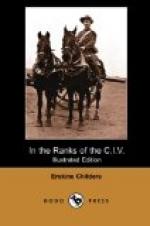“For a ‘stableman,’ as I am now, the evening is rather a busy one. At seven you have to make up the feeds for the last feed; at 7.45 put them round the harness-sets behind the horses; at eight feed, for which all hands turn out; at 8.30 take off nose-bags and put on muzzles; and after that make up another feed ready for early next morning. You can’t finish before ‘lights out,’ and have to go to bed in the dark, to the loudly expressed annoyance of your neighbours in the tent (I sleep in a tent these nights), on whose bodies you place the various articles of your kit while you arrange your bed, and whose limbs you sometimes mistake for materials for a pillow, when you are composing that important piece of upholstery.
“May 30.—Wednesday.—In the afternoon Williams and I went to visit a friend in Langman’s Hospital. Bloemfontein is a town of hospitals, red crosses flying at every turn. The mortality is high, even, I was surprised to hear from our friend, among sisters and hospital orderlies. Out of six sisters in his hospital, which seemed a very good one, four had enteric at the time, and one had died of it. I was on picket duty this night, and had a lively time chasing loose horses in the dark. A new sort of head-rope we are using seems very palatable to the horses, as they mostly eat it for supper, and then get loose.
“May 31.—Out at riding exercise we came to a fortified kopje, where we dismounted, and were allowed to examine a beautifully made trench running round the top, very deep, and edged by a wall of stones arranged to give loopholes. Some one found a Boer diary in the dust, the entries in which seemed to alternate between beer and bible reading. We always water at the common trough, the last thing before return. Such varieties of the horse species you could see no where else; thick, obstinate little Argentines, all with the same Roman noses and broad, ugly heads; squab little Basuto ponies, angular skeletonesque Cape horses, mules of every nationality, Texan, Italian,




